Congress once again finds itself staring down a government shutdown, and the lines are being drawn clearly. This week, House Republican leaders rolled out a stopgap spending bill designed to keep the lights on past October 1 and extend government funding through November 21. The measure—commonly called a continuing resolution—also includes tens of millions of dollars for security assistance to lawmakers and federal officials, a response to growing concerns about political violence in the wake of the assassination of Turning Point USA founder Charlie Kirk.
The Republican plan is straightforward: avoid a shutdown now, stabilize the immediate situation, and deal with larger, longer-term policy debates later in the year. But Democrats, led by Senate Minority Leader Chuck Schumer and House Minority Leader Hakeem Jeffries, wasted no time blasting the GOP’s proposal. In a joint statement, they declared: “The House Republican-only spending bill fails to meet the needs of the American people and does nothing to stop the looming healthcare crisis. At a time when families are already being squeezed by higher costs, Republicans refuse to stop Americans from facing double-digit hikes in their health insurance premiums.”
They went further, accusing Republicans of following the direction of former President Trump rather than focusing on governance: “By refusing to work with Democrats, Republicans are steering our country straight toward a shutdown. President Trump called the play last week when he told Congressional Republicans to jam a partisan spending bill down the throats of the American people without Democratic support. Instead of governing, Republicans are once again taking orders from Donald Trump, hurting the American people and recklessly marching our nation to the brink of a shutdown.”
At the center of the Democratic objection is the question of Obamacare subsidies. The enhanced tax credits under the Affordable Care Act are set to expire, and Democrats want them addressed immediately in this stopgap measure. Republicans, however, argue that the issue is not urgent for this short-term bill. “We have until the end of December to figure all that out,” House Speaker Mike Johnson explained, signaling that broader negotiations will come later this year.
From a conservative perspective, the dynamic is familiar. Republicans are attempting a common-sense solution to keep the government funded without bloating the budget or using a short-term crisis to expand entitlements. Democrats, on the other hand, are once again insisting on tying emergency funding to long-term welfare programs, using the threat of a shutdown as leverage to force more spending through. The constant push to entangle short-term funding bills with permanent expansions of federal programs reflects a larger pattern: Washington’s appetite for bigger government rarely rests.
The insistence on immediate action regarding ACA tax credits is less about timing than about strategy. By trying to attach it to a must-pass spending bill, Democrats are attempting to shield Obamacare subsidies from real debate later in the year, when Republicans could press for reforms or cuts. For fiscal conservatives, this is the heart of the matter. Short-term resolutions should keep government operational and provide breathing room—not be used as a backdoor for entrenching permanent, expensive federal commitments.
As the deadline nears, Republicans face the dual challenge of holding firm against Democratic demands while also demonstrating that they are the adults in the room working to prevent a shutdown. Their proposal keeps the government open, adds resources for protecting public officials, and pushes off divisive fights until a more appropriate time. Democrats, however, appear intent on using the threat of shutdown to score political points and expand government’s reach.
With less than three weeks until the October 1 deadline, Americans are watching closely. The question is whether Congress will choose a pragmatic path forward—or whether political brinkmanship will once again leave taxpayers holding the bag. For conservatives, the answer lies in resisting attempts to fold every progressive wish list item into a bill meant simply to keep the lights on.




















